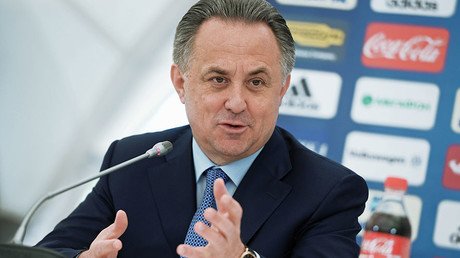The German broadcaster ARD, which released several documentaries allegedly exposing doping in Russian sports has no solid evidence to back its claims, a lawyer from the All-Russian Athletics Federation (ARAF) said after a court hearing in Moscow.
“The whole point of the ARD and the journalist behind the documentary was not actually to prove anything. The goal was simply finger pointing and blackening. So there was no real intention to conduct a proper investigation in order to reveal whether the allegations were really true or false,” Artem Patsev, the lawyer of the Russian Athletics Federation, told RT.
The hearing took place in December in a Moscow court after the All-Russian Athletics Federation filed a complaint against the authors of the documentary and the ARD accusing them of damaging the organization’s reputation.
According to the court documents, the lawyer of the ARD and the documentary authors were unable to present any concrete evidence that would substantiate the claims made in the documentaries concerning alleged doping in Russian sports. The lawyer also admitted that she did not know if the ARD channel had any proof of the doping allegations made in its documentaries.
In December 2015, the court ruled in favor of the plaintiff and obliged the German ARD/WDR broadcasting corporation as well as the author of the documentary, Hans Joachim Seppelt, to pay a symbolic fine of one ruble ($0.015) and legal expenses of 12,000 rubles ($185).
However, the court didn’t oblige ARD/WDR to retract allegations made in its film, as the company has no office in Russia.
Following the court’s decision, the broadcaster said in a statement that the allegations made in the documentary were “impressively confirmed” in the WADA report, adding that the WADA commission “had access to the original evidence, which provided the basis of the documentary, unlike the court in Moscow.”
The company complained that it was not “duly informed” of the court hearings, calling the formal procedure of the court “a cause for considerable concern.”
In December 2015, Seppelt denounced the court hearing as “a mock trial without any substance” and a “farce,” implying he also was not informed in time about the hearing. He also admitted the evidence in WADA’s possession hadn’t been available to the Moscow court.
In a letter sent to RT on June 13, the ARD/WDR said that it had “thoroughly checked the statements made by, and the documents received from the Stepanovs” and “believes that they [documents and statements] are true.”
At the same time, the company failed to provide any evidence that could corroborate Stepanov’s allegations and revealed nothing about the nature of the proof it is said to possess. Instead, the ARD/WDR once again stressed that the WADA commission “also established in its report of 09.11.2015, that the statements and documents obtained from Vitaly and Yulia Stepanov corresponded with the truth.”
In the meantime, the ARD has continued to release documentaries on alleged doping in Russian sports. The latest documentary film dedicated to this topic was aired by ARD on June 8. The documentary alleged that Russia’s Sports Minister Vitaly Mutko was involved in the doping scandal.
In the film, called “Showdown for Russia,” the broadcaster reports that the country’s sports minister had covered up a positive doping test by a footballer from Russia's top league, citing documents allegedly supporting the accusation. It also claims it has videos of banned coaches continuing to train Russian athletes.
Mutko dismissed all allegations by denouncing them as “information attacks” and attempts to influence the decision on whether to allow Russian athletes to compete in the Olympic Games in Rio de Janeiro, which are to be held in August 2016.
Three previous ARD documentaries on doping in Russian sports led to an investigation and the suspension of Russia's track and field team by the International Association of Athletics Federations (IAAF) and the World Anti-Doping Agency (WADA) in 2015.
Russia was suspended from world athletics in November 2015, after WADA published the results of an international investigation into the athletes of the Russian Athletics Federation, Moscow's anti-doping laboratory and the Russian Anti-Doping Agency [RUSADA]. The investigation revealed widespread doping and corruption in Russian sports.
In response to these revelations, Mutko said that the Russian Prosecutor General’s Office is investigating all the facts connected with the doping scandal, and might soon launch criminal cases.
The Russian Sports Ministry was ordered to reform its structures involved in doping offenses and to root out cheating. The IAAF created an inspection team, to monitor the progress of the reforms.
The final decision on whether to bring back Russia into the IAAF will be adopted at the next meeting of the Council on June 17. If the team is not restored as a member of the IAAF, Russian track and field athletes will not be allowed to take part in the Rio Olympics.

